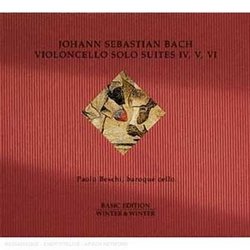| All Artists: Johann Sebastian Bach Title: Bach: Cello Suites 4-6 Members Wishing: 2 Total Copies: 0 Label: Winter & Winter Release Date: 11/17/1998 Genre: Classical Styles: Chamber Music, Historical Periods, Baroque (c.1600-1750), Classical (c.1770-1830), Instruments, Strings Number of Discs: 1 SwapaCD Credits: 1 UPC: 025091002726 |
Search - Johann Sebastian Bach :: Bach: Cello Suites 4-6
 | Johann Sebastian Bach Bach: Cello Suites 4-6 Genre: Classical
|
Larger Image |
CD Details |
CD ReviewsPersonal reading Mr JB | Karlskrona Sweden | 02/07/2001 (4 out of 5 stars) "Since these suites are for a solo instrument, the demands on, and the possibilites for, the interpreter are huge since every little detail will be heard clearly (if the sound engineers has done a good job!). Many versions therefor are too 'easy' or too romanticized, I think, making them nothing but 'middle of the road'. Fortunately, there are a few really good interpretations, mentioned further down this review, that holds the artistic aspects of the work higher than it's sell ability. I think Beschi's version is one of those pleasing exceptions. Beschi here gives a racy, yet not fierce or too powerful interpretation of Bach's last three cellosuites, with a rather dark underlying feeling of solitude that's present most of the time. To me Beschi's playing sounds like a tone-painting of a lonely person sitting in front of a window, with a winter landscape outside, thinking both of days gone by and of hopes for tomorrow - agitated emotions blends with moments of bright hopefulness, sometimes decisive, sometimes sorrowful. As is obvious from my comments so far, this is an engaging and intense reading of Bach's lovely cellosuites, yet never even close to the borders of banality or sentimentality. What I think differ this recording from many other versions is the feeling of winter and solitude that strikes me everytime I listen to this record. The coldly recorded cello sound may be one possible explanation, another may be that Beschi plays a time period baroque cello, which means that the sound is almost entirely vibratofree and more direct. This together with Beschi's well thought-through virtuoso playing ensures you a record that never gets boring for a single second - it's impossible to just have this going in the background since it's impossible not to get caught buy the playing. The speeds are wide, rather fast at times, but never hasty or sounding wrong. I think this Beschi version is at least equally recommendable to Rostropovich's simple & lovely version and Yo-Yo Ma's playful and very varied interpretation. Both these versions have a warmer sound that's more like we're used to hear a cello, but Beschi's version has the same virtuosity combined with an intensity and personal seriousness that none of the others have, which makes it my personal favorite. Highly recommendable!" A Crowded Field Giordano Bruno | Wherever I am, I am. | 07/24/2010 (5 out of 5 stars) "Wow! The only previous reviewer, "Mr JB", calls this performance of the 4-5-6 cello suites his "favorite", yet gives it only four stars! Uf ta, there's no grade inflation where he lives. Bach's six suites for solo cello rank, for me, among the few justifications for humanity's claim to a special place in the cosmos. Even the most routine interpretation of them always moves me and tells my ears something new about them.
Paolo Beschi is the cellist of the piano trio ensemble La Gaia Scienza, whose recordings of Schubert and Brahms have thrilled me head to toe. I was excited, therefore, to discover that he has recorded the Bach suites, and I rushed to order the CDs. I have Suite 6 playing behind me as I type. I've listened raptly to suites 4, 5 & 6 now. Beschi plays a robustly dark, well-bottomed baroque cello, and its 'anthracite' clarity of tone is rendered even graver by the recording technology of this CD, with the mike(s) extremely close to the instrument, I think. You can hear Beschi's 'technique' without any possibility of fudging or muddling it with studio-resonant mellowness. Beschi's Bach is all seriousness, a brooding thinker. He takes the tempi of some movements, especially in #4, as slowly and gruffly as musically justifiable or physically possible. But then he spins and soars on #5, emphasizing its higher tessitura, allowing his cello to aspire to sopranodom. Suite #6 is his most vivid interpretation. His solemn tempi and phrasing sometimes favors the tone colors of the music over the unifying dance rhythms, but on the whole this is a very fine performance. Mr JB is certainly correct in preferring it to the recordings he mentions, by Rostropovich and Ma. However, recordings of the cello suites, even those on proper baroque cellos, run into stiff competition. I've carefully listened to Boschi's performance, suite by suite, in comparison to Ophelie Gaillard's and to Jean-Guihen Queyras's on A440 modern cello, and I feel no hesitation in declaring that Gaillard's is the best. She brings more lively variety to the music phrase by phrase, and more unity to each suite dance by dance. She never sounds as if she's lost focus. I was quite impressed by Queyras's performance when I first heard it -- as I am, don't get me wrong, with Boschi's -- but over many listenings I've discovered 'richnesses' in Gaillard's that Queyras doesn't match. If you really think that you only need one interpretation of the Suites, and only the best one, buy Gaillard's now, without a further moment's thought. But if, like me, you know in your heart that no single interpretation can ever be definitive and preemptive, you'll definitely find Paolo Boschi's Bach well worth hearing." |

 Track Listings (21) - Disc #1
Track Listings (21) - Disc #1